
by Lorelei Marcus
The incomprehensible versus the inconceivable
Alright, I admit it. My love affair with Star Trek is on the rocks. I think what hurts the most is that I wanted to love this show. Everything was stacked in favor of a whirlwind romance: A science fiction premise, a multi-racial cast, serious plot lines, and a high budget. But ultimately, there's one fatal flaw standing between me and complete commitment.
I can't stand fluffy science fiction.
In other words, I like stories about complex futuristic societies, spaceships, aliens, and wild scientific discoveries, as long as there's some explanation to how it all works! Books like The Moon is a Harsh Mistress, World of Ptavvs, and Earthblood, to name a few, have given me that satisfying extra layer of realistic depth that I love. And Star Trek…hasn't.
Sure, there are hints about the operation of a larger universe, and crumbs of detail about how certain technologies work, but for the most part, strange happenings are explained away as "psionic powers" or "extremely advanced technology"
"Shore Leave" was particularly egregious. The crew stumbled about the whole episode while a third party is teased in the background as being the orchestrators of the situation with the use of some interesting technology. In the end, we do not meet this third party, but of course, their machines are "beyond human comprehension" and we get no further explanations or analysis of this entirely new alien race.
With all this being said, you may be surprised to find that I did love the most recent episode of Star Trek, "The Squire of Gothos", a story that features psionic powers, hyper-advanced technologies, and not much explanation about how any of it works.
This is entirely due to the subtle difference between the inconceivable and the incomprehensible. I will explain in a moment. But first, a summary for those who missed it:
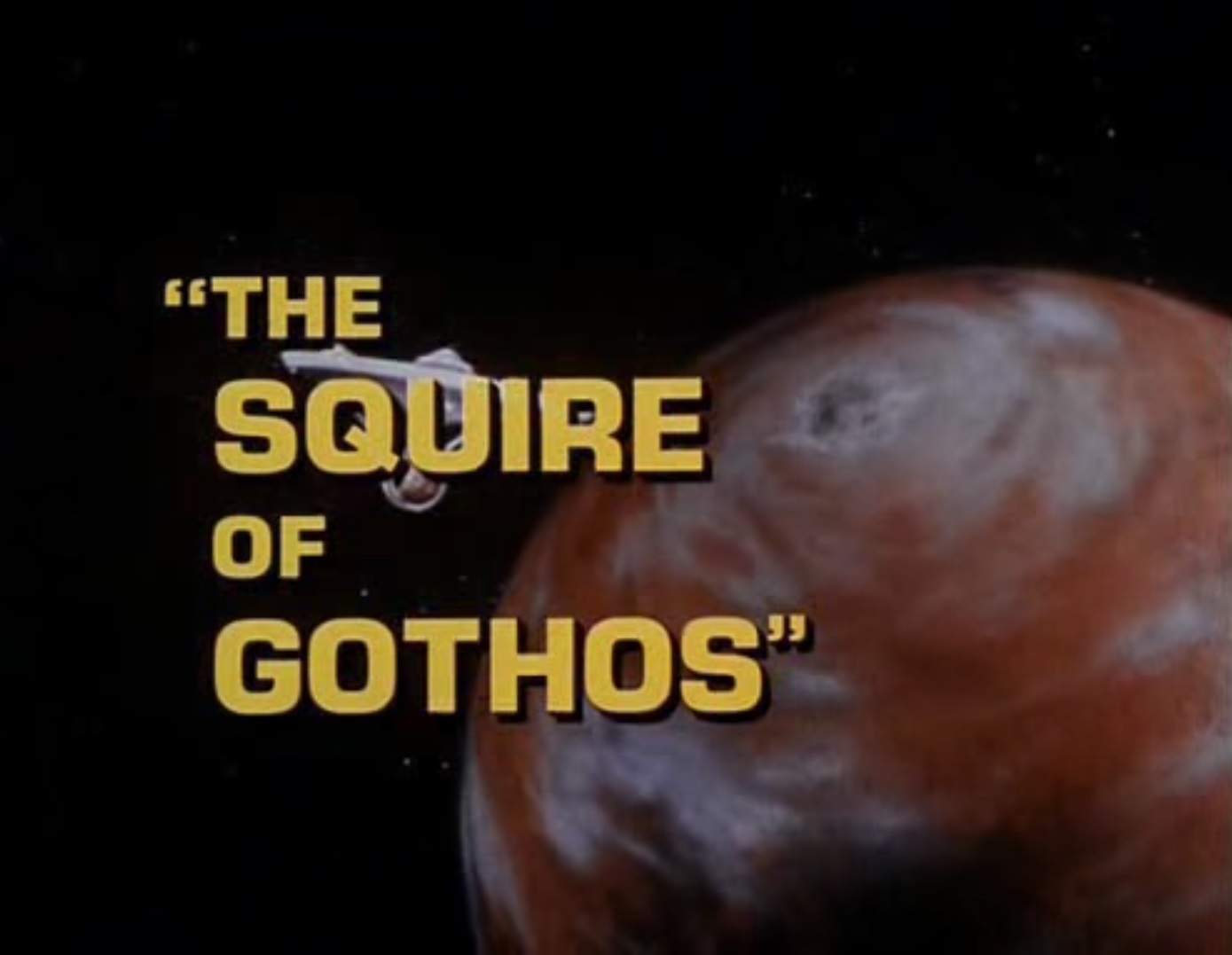
Cruising across a star desert, the Enterprise happens upon an unexpected planet. Before they can investigate, Captain Kirk and Mr. Sulu disappear from the bridge. After a quick scan from the ship's sensors, it is determined that the planet's atmosphere is toxic, composed largely of methane, and unbearably hot–normally uninhabitable by human life. Mr. Spock decides to beam down a party anyway. I really appreciated this first scene, because it sets up the mystery of Gothos well, and also throws in actual scientific detail. It also addresses that commanding officers shouldn't be assigned to landing parties (a problem this show has had numerous times). Spock refuses Scotty's request to be sent down with the party, and he, of course, stays on the ship as well. Little things, but important ones.
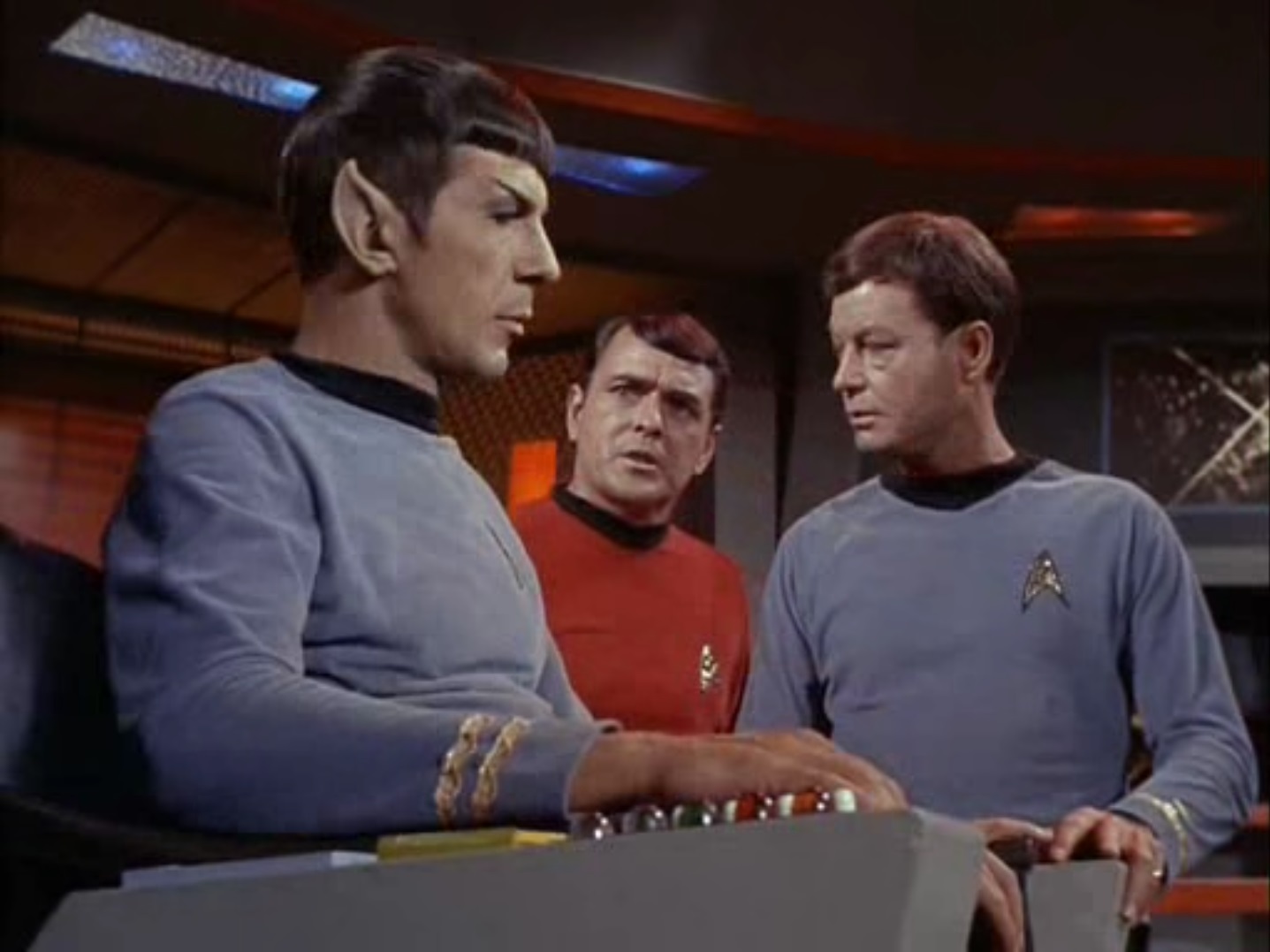
Scotty makes an admirable but inadvisable request to search for the Captain
The landing party quickly groups up with Kirk and Sulu in an 1800's-style house (finally a set other than foam rocks!), which resides in a small portion of the planet with an Earthlike climate. The entity behind this anomaly presents himself as retired General Trelane (William Campbell), a man in ancient garb who speaks in archaic idiom. Trelane has been studying Earth from afar, but as one crewmember points out, his information is 900 years out of date–the time it would take light to reach Gothos. Yet another scientific detail that crucially adds to the story and also, happily, allows us to extrapolate that Star Trek takes place sometime in the 28th Century. [The events of "Miri" suggest Star Trek occurs in the 23rd Century. Someday they'll get it straight… (ed.)]
Kirk, disgruntled at being taken from his ship by force, demands to be sent back with his crew, but Trelane ignores this request entirely, continuing to play with them. Thus ensues a long game of cat-and-mouse with Kirk leaving and returning to Gothos three times in the course of the episode. The Enterprise seems to escape twice only for Trelane's power to prove overwhelming. Even when they destroy what seems to be the source of Trelane's ability to convert energy to matter and back again, the Squire ensnares them.
Hoping to at least save his ship, Kirk agrees to a one-on-one game of Hunt with Trelane, so long as he promises to free the Enterprise in return. Trelane agrees, though at the point of victory, he announces his plans to renege. With his sword pointed at Kirk, two heavenly beings shimmer into existence to reprieve the captain and reprove their…son?
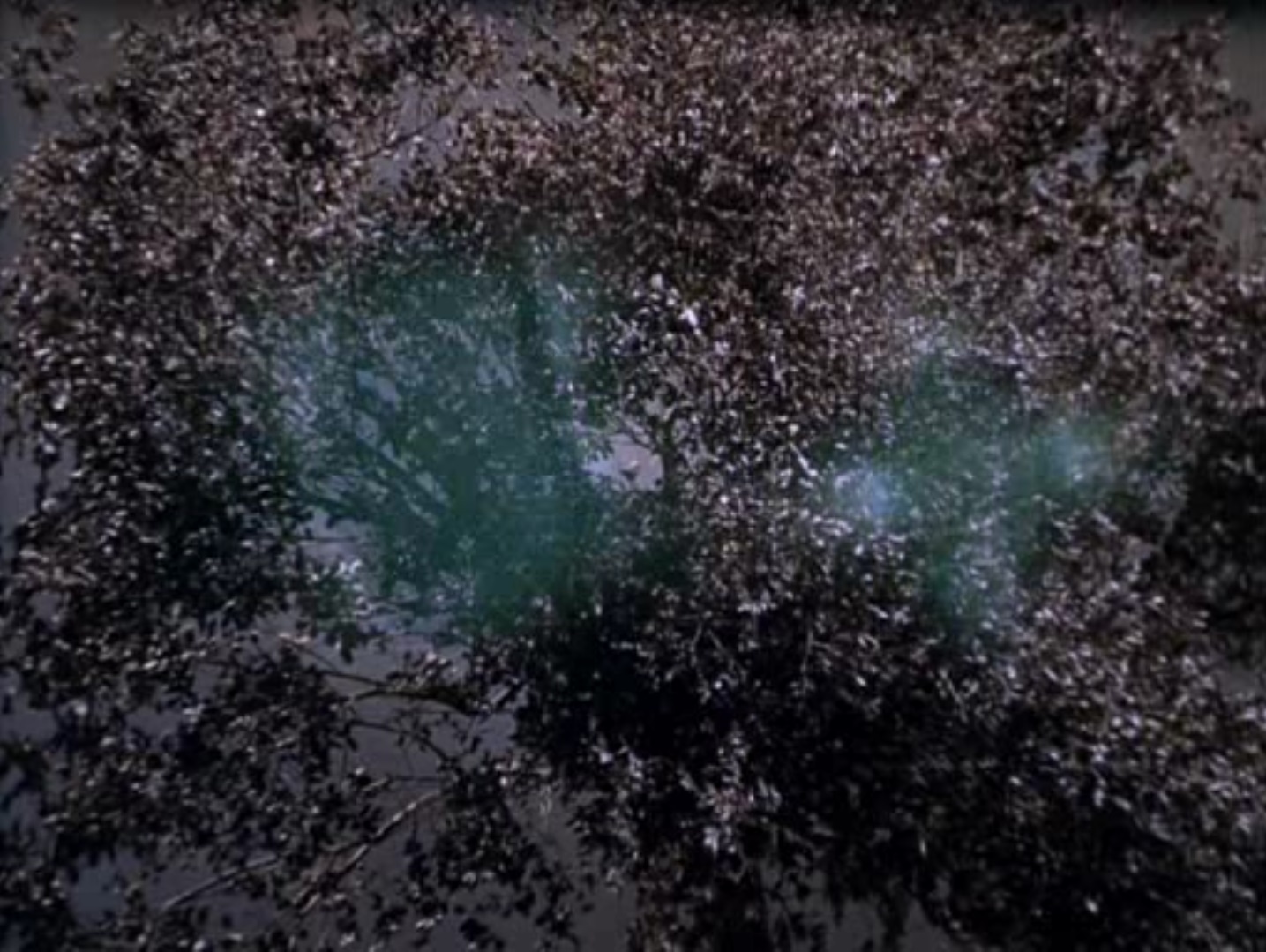
"Oh hi, mom, dad."
Trelane's posh demeanor falls away, and it is revealed that he is actually much younger than we initially thought (in maturity, at least). It's a twist, I'll admit, I did not see coming, and which reframed the entire episode. This is one of the few I'd like to catch in summer reruns knowing what I know now.
So what makes this episode so great? As hinted at before, it's the little things. Here's one: when Trelane first meets the landing party, he extrapolates their extractions by their last names and greets them with stereotypes of their nationalities. When he bows to Sulu, the helmsman scoffs, "You gotta be kidding." (We all know Sulu is French. Just watch "Naked Time"). I also appreciated that, when Trelane bows condescendingly to Sulu again later on, it's his fellow (white) crewman that angrily attacks the Squire. I appreciated that, in the future, racism is both ridiculous and not tolerated–by its targets nor their allies. The only other show where I've seen this kind of progressiveness is I, Spy, another Desilu production.
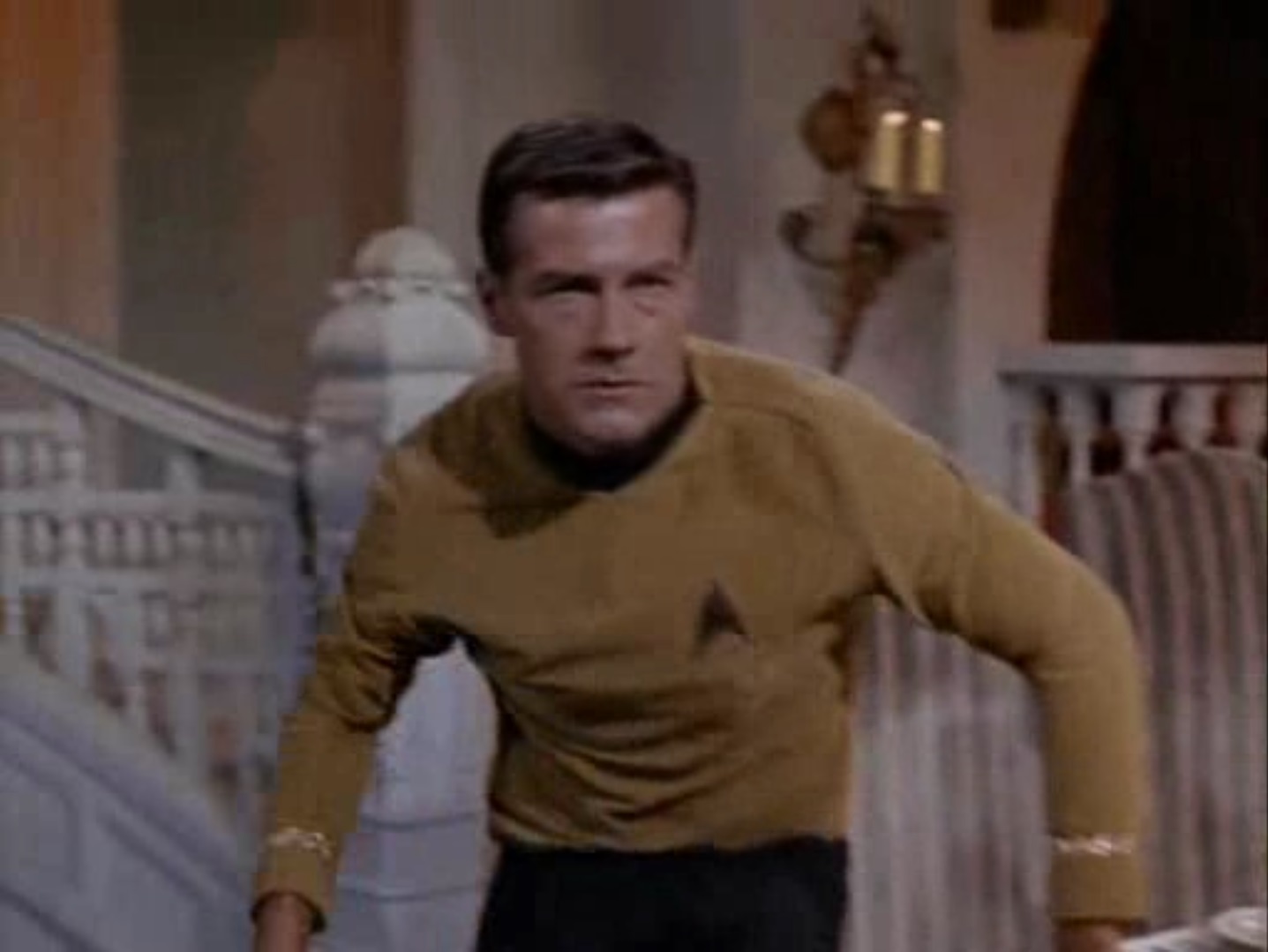
DeSalle won't stand for Trelane's bigotry.
Beyond this, this episode never failed to surprise me. First Spock uses rational thinking to extract the landing party. Then, when he and his team are captured again, Kirk uses deductive reasoning to determine that Trelane is not infallible, and that his power must be coming from a machine, not the Squire himself. He maneuvers the situation such that he can destroy it and thus makes an escape. In any other story, this would have been the end of it. The hero outsmarts the villain and saves the day. But Kirk's guess is wrong, or at least incomplete. In the end, he is saved seemingly by chance alone (though it does seem Trelane's "parents" may have been monitoring their little brat.)
I think it is this twist of orthodox storytelling that gets to the heart of my point. In most other episodes, the enemy is "inconceivable". We are told that their powers or their technology is beyond our understanding and there is nothing to be done about it. In "The Squire of Gothos", we are shown that while some of Trelane's powers can be reasoned at, they are "incomprehensible"; we still cannot understand them enough to defeat him by human means alone. Paul Schneider, the screenwriter for this episode [and also "Balance of Terror" (ed.)], gives us just enough details to make Trelane believable, even if he is unbeatable. That's good writing and good science fiction.
I give this episode 4.5 stars. There are a few flaws, mainly in the drawn-out ending, which also misses an opportunity to expand on the alien race. There are logical inconsistencies: Trelane doesn't know what food tastes like, but he knows what music sounds like. Still, I enjoyed it, from the acting to the costumes. It has restored my faith in Roddenbery's show just a little longer.
Perhaps there is still a chance for my romance with Star Trek after all.

by Gideon Marcus
All the old, familiar faces
I'm still trying to parse my thoughts about this latest outing of the good ship Enterprise. In many ways, it feels like a patchwork of things I've seen before. Kirk and crew finding an uninhabitable world, with a terrestrial habitat set up by an enticing but ultimately deadly alien menace, calls to mind Uranus in The Seventh Planet. The improbable, out-of-time nature of the villain (and good on Trek for landing a guest appearance by Liberace!) seemed straight out of a Lost in Space episode. The moody cinematography, somehow lending an objectively goofy episode more gravitas than any outing of Nelson's Seaview, as well as the revelation of Trelane's true nature, felt very Serling-esque to me. And, of course, the Squire of Gothos ("Bothos" according to my paper) appears to be a close cousin of Charlie Evans, who the Enterprise team met in "Charlie X"."
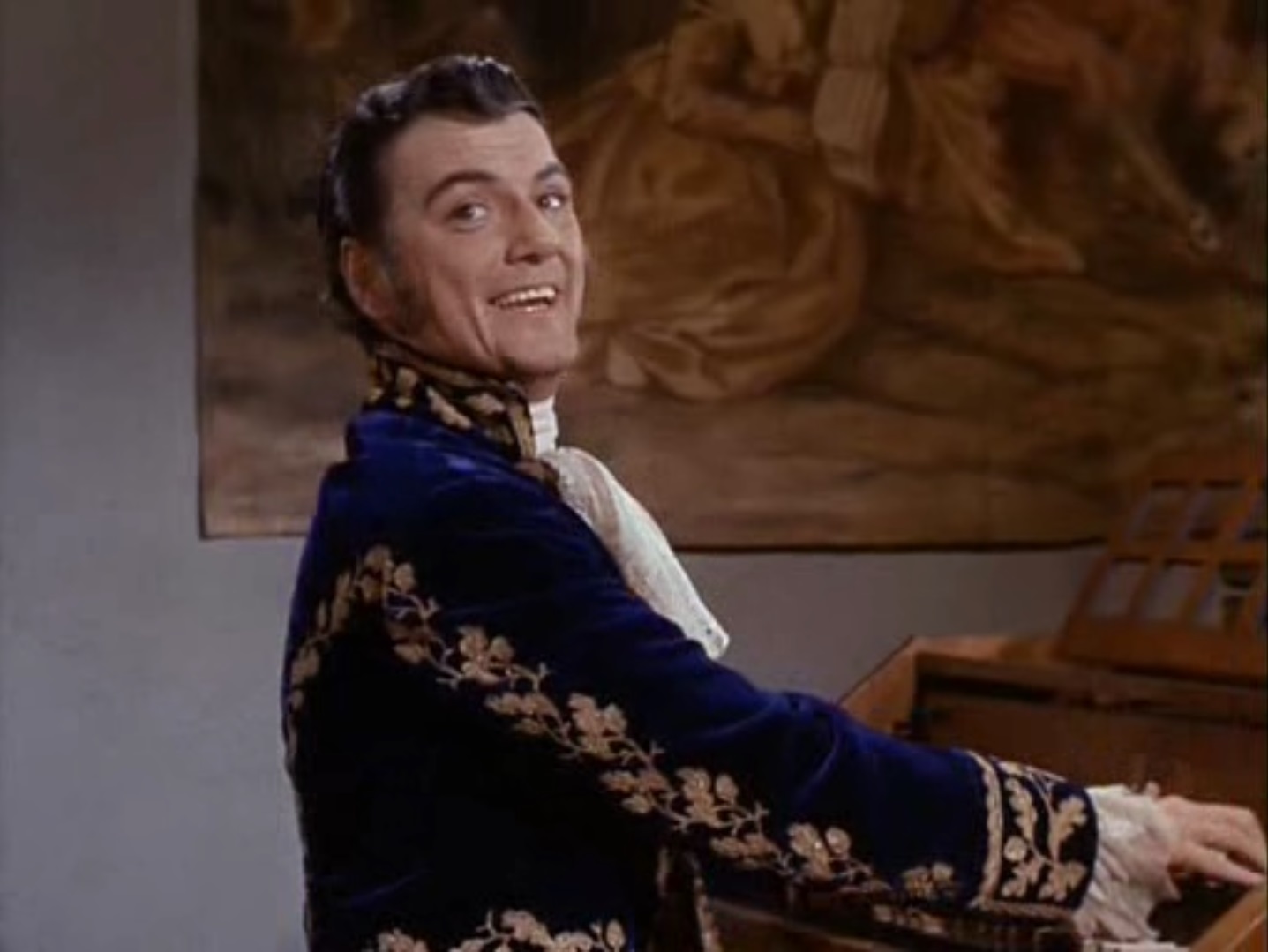
Liberace's latest tour: The Sahara, the Hollywood Palace, and Gothos!
I did feel Kirk could have been more diplomatic at the beginning (his job is to seek out new life and new civilizations), and Trelane's ranting at the end was about twice as long as it needed to be. It's an episode that shouldn't work, but the professionalism of the Starfleet officers, as well as the actors playing them, sees it through. And the planet, as seen from orbit, was stunning. As one 'zine lettercol writer noted, it's like something Chesley Bonestell might have painted.
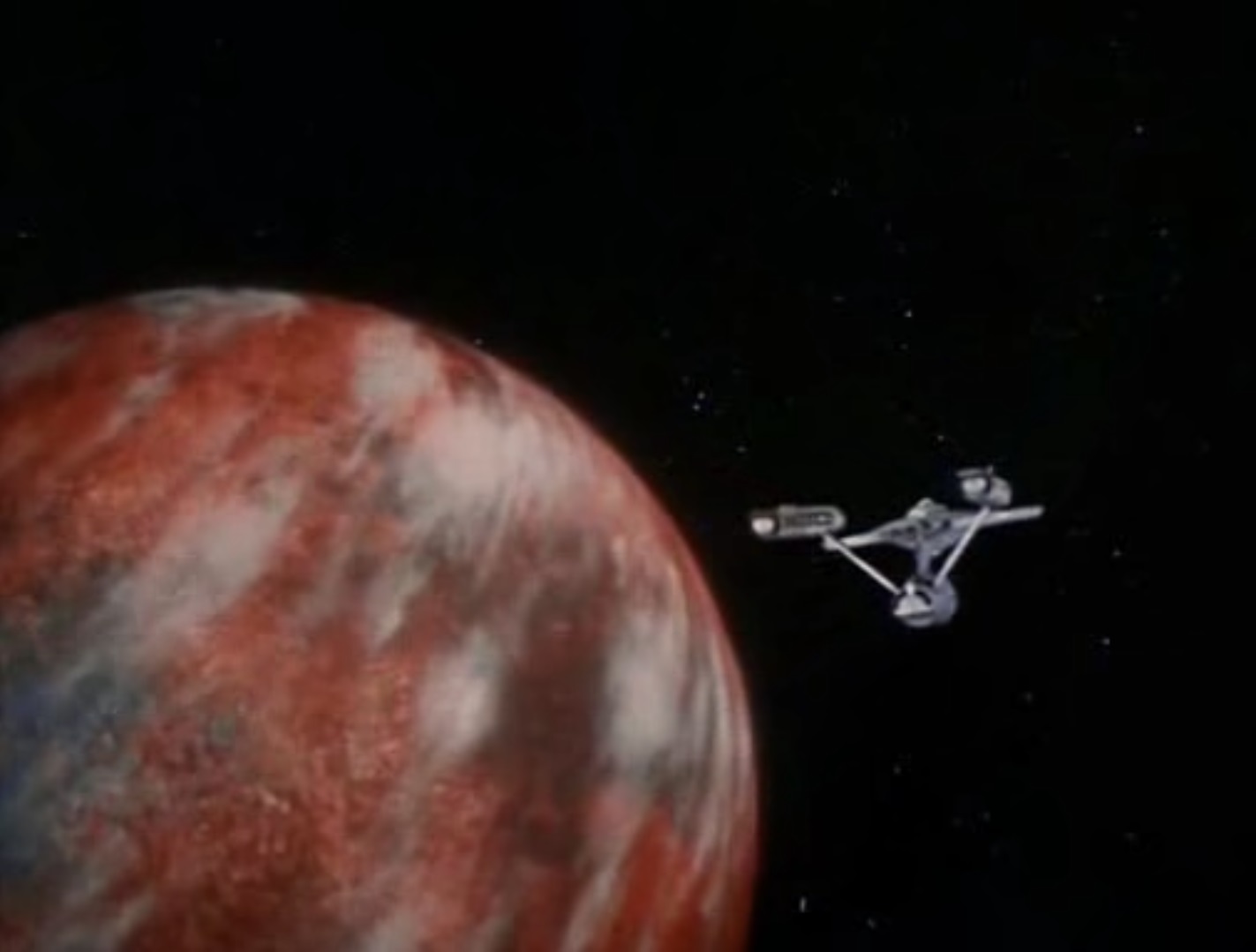
Three stars.

by Elijah Sauder
Through the eyes of a child
"The Squire of Gothos" explores an interesting concept: how the human species looks to an outside observer. In "Gothos", we see humans (and a human/Vulcan hybrid) through the eyes of a super advanced immature child. I feel this idea could be explored in greater depth.
If there were something, living or otherwise, that could observe us, what would their thoughts of our civilization be? Would it focus on the outward facing, publicly praised bravado and gregarious exploits of our luminaries and stars, or would it take notice of the simple home life? Would it, as the episode suggests, focus on the military exploits and gallant behaviors of the famous members of our species, or would it become fascinated with the social, educational, and working life of the general populace? We may never, nay probably will never know; however, I feel inclined to side with the writers of this episode in that they (this hypothetical super advanced thing) would focus on the glamor and intrigue of the people who have made names for themselves. Maybe that is my humanity talking, but it is what makes the most sense to me.
To me, the introduction of this idea alone is one of this episode's saving graces–I was not partial to the conclusion of the episode, which focused on the immaturity of the antagonist of the episode. As a whole, I feel this episode scores 2.5 out of 5.
Again? That Trick Never Works

by Erica Frank
While Trelane's appearance and setting were unique, I had the distinct feeling we'd met him before… several times. Star Trek keeps revisiting the plot, "someone with godlike powers decides that the crew of the Enterprise is a set of living toys for them to play with; no amount of force or reason can change his mind; instead, a combination of luck and deus ex machina interventions saves the day."
I will set aside, for the moment, the nonsensical background of this episode–an alien who studied humans enough to create a historical house complete with ancient weaponry, but failed to notice that peaceful exploration missions exist. Perhaps Trelane truly is that oblivious, or perhaps he understands that war isn't what humanity is about–but it's what interests him, so he's going to pretend all humans he meets are warriors.
However, I'm growing very tired of near-omnipotent aliens (or humans with alien powers) who somehow have the manners of a bratty five-year-old who's been told he's not getting ice cream after dinner. The recurring message of "with great power comes great vice and great pettiness" is really starting to annoy me. I'd like to believe the future, alien worlds, and exotic technology can bring out the best in people, not just their worst. But aside from that–it makes for a boring story.
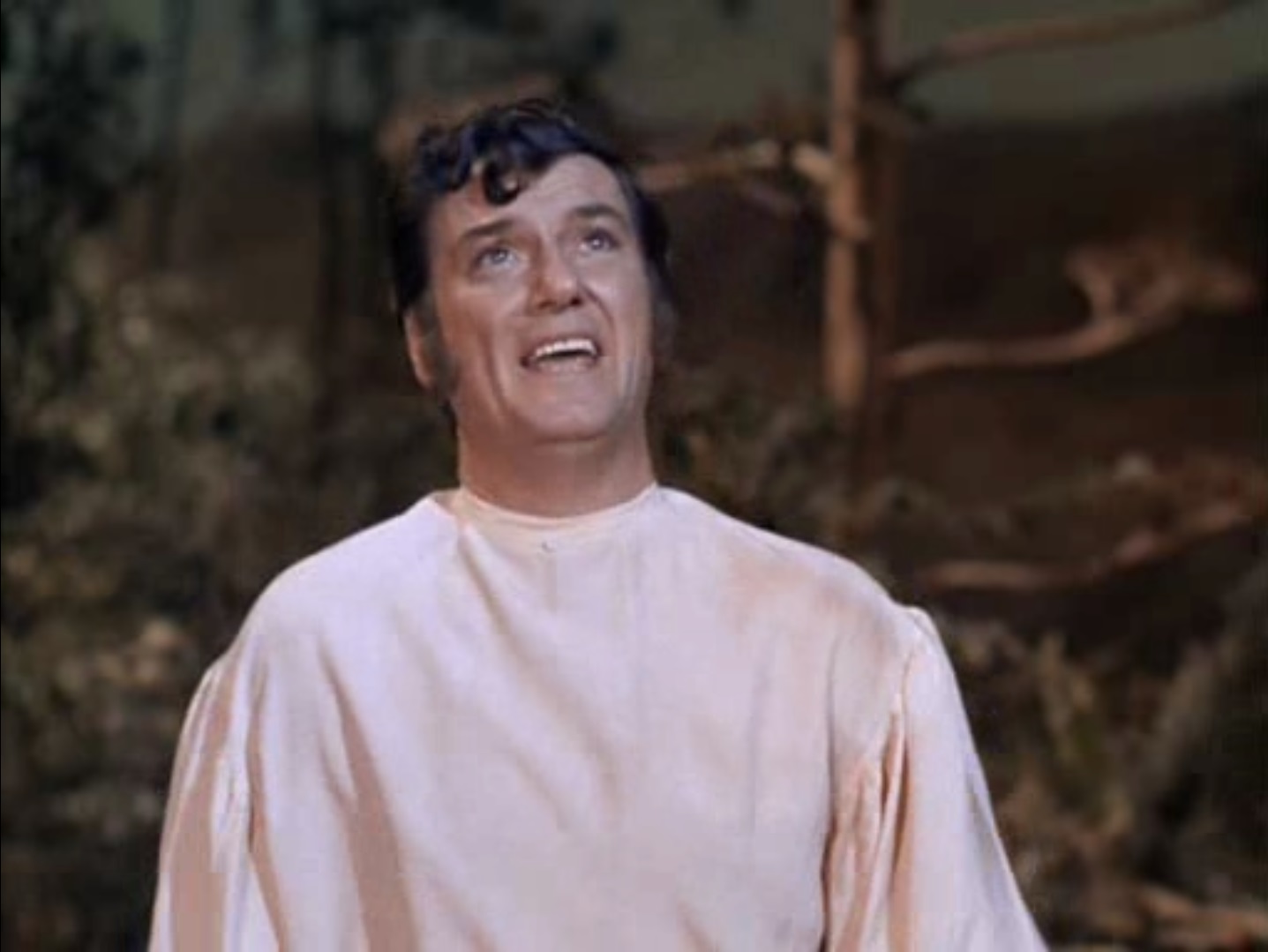
We've seen "powerful person decides to ignore both law and local customs, and lacks any shred of empathy" several times: in "Charlie X," in "Where No Man Has Gone Before," in "Dagger of the Mind," and in "What Are Little Girls Made Of?" None of those are bad stories in themselves… but that's almost a third of the show taken up with minor twists on the same theme: "Absolute power corrupts absolutely."
I do hope Star Trek starts showing more variety in its super-powered beings. The alien in "Shore Leave" was a nice start; I'd like to see more like him. I'd like to see less like Trelane, who reminded me of Eros from Plan 9 from Outer Space–I almost expected him to start yelling "Stupid!" at Kirk for not sharing his love for war history.
One and a half stars. Kirk got into a sword fight and didn't even get his shirt ripped.
Diplomacy, Even When It’s Hard

by Jessica Dickinson Goodman
I wanted to dive into one small, but I think important part of this episode: Captain Kirk’s complex commitment to peace. We’ve seen an odd mish-mash of military and scientific hierarchies on the Enterprise that don’t clearly mesh with any modern civilian or martial system I’m familiar with. My current best guess is that whatever broader organization built the Enterprise and manages the vast resources necessary to maintain her and her crew is similar in structure to something like the U.S. State Department, with Foreign Service Officers who hold titles directly equivalent to military ranks, or the U.S. Public Health Service, whose commissioned medical officers serve in uniform but are not under another branch of the military.
It is clear to me that while the Enterprise may be armed like a warship, its crew does not think of her as one. As Captain Kirk says in this episode: “Our missions are peaceful, not for conquest. When we do battle, it is only because we have no choice.”
Later in the episode, we see Captain Kirk do battle twice precisely because he has no choice. Up until that point, he avoids direct confrontation as consistently as he can, engaging in diplomacy with a being that seems to have no concept of the idea. (Perhaps if Trelane idolized Napoleon a little less and Benjamin Franklin a little more, he would have understood more of Captain Kirk’s strategies).
But while Trelane is ignorant of diplomacy as a method of connection and conflict resolution, Captain Kirk is not naive to the allure of violence. First in the Hamiltonian-duel and then in the sword fight, he eggs Trenlane on, encouraging him to become more violent, particularly towards Kirk’s own person. As he says: “Then vent your anger on me alone.”
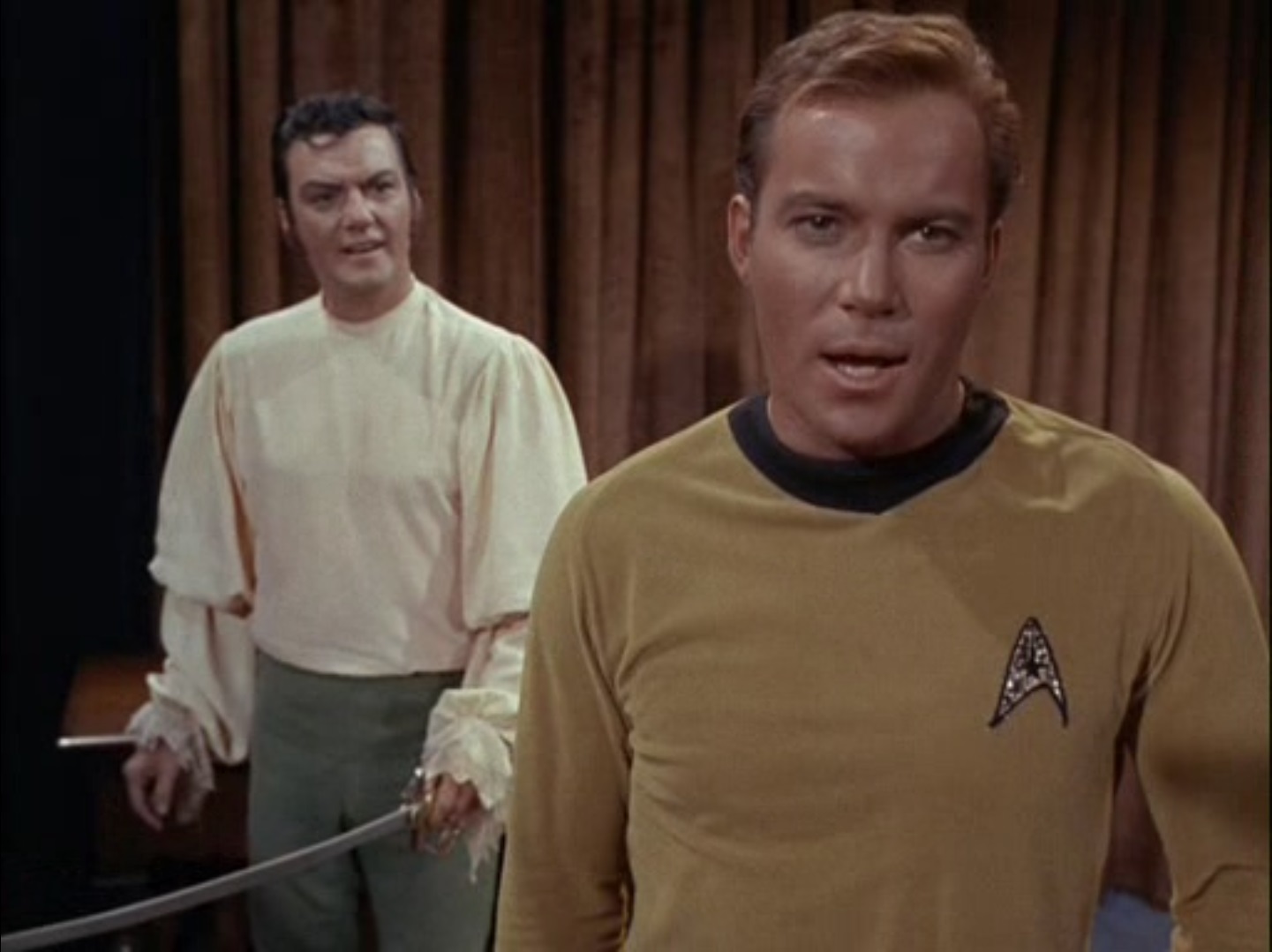
One does worry about Captain Kirk’s habit of inviting violence towards himself. It seems that Kirk’s commitment to peace is institutional and systemic, but not necessarily personal. To put it more simply, the Enterprise’s missions may be peaceful, but Kirk won’t always be.
There are significant limits to standing in front of bullets to hope the other person stops shooting. As Erica mentions, the resolution of this episode was a somewhat formulaic deia and deus ex machina, and one wonders what Kirk’s plan was if Trelane’s parents hadn’t removed him. Keep fighting forever? Keep surviving by what Malcom X (citing Frantz Fanon) would call “any means necessary”? One struggles to imagine Captain Kirk just laying down and dying, particularly not if his crew was still in danger. But we don’t really know what his system of ethics is. As Lorelei notes, we just don’t get much more than hints about the broader universe, the broader way of life that Kirk is reacting to or operating under.
A U.S. Consul serving in an embassy abroad has the same rank as Captain in the U.S. Navy and the U.S. Surgeon General is a three-star Admiral, but I would no more expect a Consul to take up arms than a three-star Admiral to write a peace treaty. But I could see Captain Kirk doing both. Trelane was wrong to assume all humans were war-loving, but there does seem to be some room for violence in Captain Kirk’s “peaceful missions,” if only when it is directed at himself.
I’ll be interested to see more of this world as it develops.
Three stars.
We may get a nice glimpse of a larger world in the next episode tomorrow at 8:30 PM (Eastern and Pacific)!
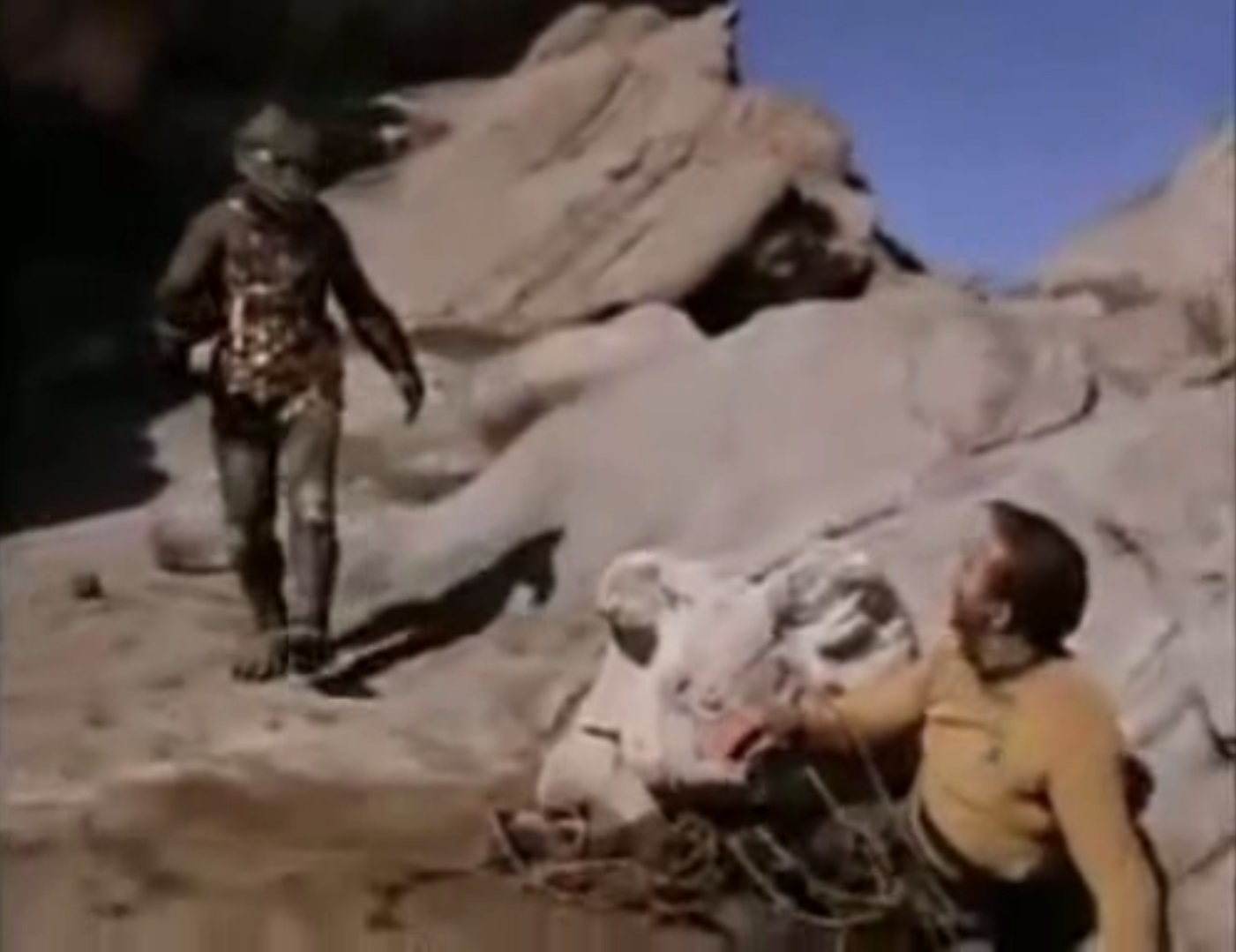

![[January 18, 1967] Temper tantrum (<i>Star Trek</i>: "The Squire of Gothos")](https://galacticjourney.org/wp-content/uploads/2022/01/670118title-672x372.jpg)

![[December 24, 1966] Unquiet on the Romulan Front (<i>Star Trek</i>: "Balance of Terror")](https://galacticjourney.org/wp-content/uploads/2021/12/661224title-672x372.jpg)











